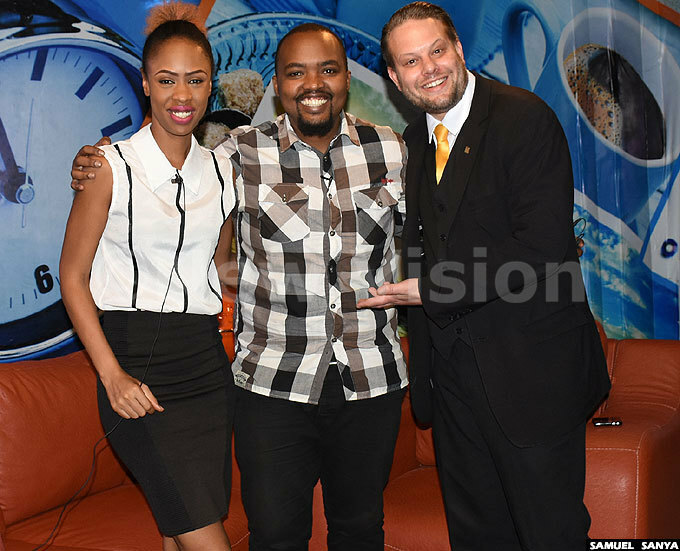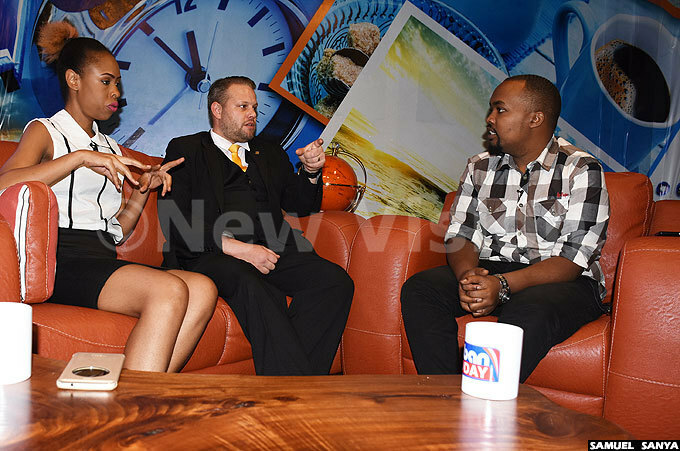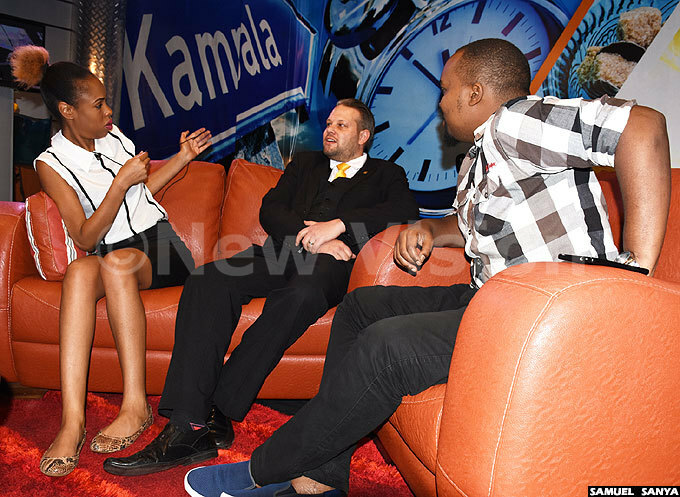A chat with one of Africa's sleekest magicians
“The process I went through was to learn very simple magic tricks from books when I was younger."
Marcel Oudejans, the African master of magic tricks. (Photo credit: Samuel Sanya)
ENTERTAINMENT | MAGIC
Would you offer the only sh20,000 note you've got on you to a magician as a ‘guinea pig' for some potentially jaw-dropping wonder work? Not an easy commitment, I bet. But if you rather get treated to a dollop of slick magical handwork than worry about having to walk back home, then you wouldn't hesitate to make a gamble on your quid.
Fortunately, most times, you'll get your money back - the way it was - after the magician is done wowing you, the audience, with his trick(s) using your note.
That's just what Urban Today's co-host Bryan Kella McKenzie experienced first-hand when renowned South African magician Marcel Oudejans delightedly took a sh20,000 note from him - upon request of course - and magically turned it into a one-dollar bill before turning it back to its original ‘Ugandan' form, much to the amazement - and relief - of McKenzie, as well as his co-host Deedan Muyira.
Marcel, in Uganda on an invite, took some time off his schedule to make an appearance on Urban TV's morning show.
In this special segment aired on Friday, the South African ‘Corporate Magician' talked about growing up, his career and his future. Oh, on top of doing what he does best: perform magic tricks live on the show!
His soft voice is as smooth as his dazzling sleight of hand. Deedan, as an active participant, did look lost in magical translation as Marcel played a game of disappear-and-reappear with orange soft balls. Once, he made her hold a ball into her folded palm, followed it up with some animated finger play, then when he offered her a cue to unfurl her palm, out popped two balls instead!
Where did the second ball come from?
Deedan and McKenzie, two usually lively show hosts, got even livelier like little kids would when showed some cool stuff, as their guest played more on their eyes with his hand and balls. Then with McKenzie's note for the shilling-turned-into-dollar-and-back-into-shilling moment.
Marcel, looking sharp in a dark suit with a half-coat, appeared even sharper as he pulled another from his huge bag of tricks. How he twisted the prongs of a stainless steel fork into whatever direction he desired is beyond my understanding! He made that table implement seem like a piece of clay that you could carve into any form you wanted. In fact, to make his trick more amazing, he would hand over the fork to either co-host during the performance to prove that it indeed was steel that, try as he could, even McKenzie failed to twist in the slightest of angles.
"Just how do you do that?" he buried his face in his arms as Marcel amazed them even more.
By the end of the show, the magician had managed to carve the fork into a sort of a plaque - like those you are awarded in the music industry - which he gave to a still-overwhelmed McKenzie as a gift for his birthday.

Magician Marcel dazzled Urban Today hosts Deedan and McKenzie
What the South African entertainer put on show is only the tip of the iceberg that is his abilities. Cape Town-bred Marcel has been doing magic for the last 25 years, an art he says he has tried to perfect over that time.
To him, learning to do magic is a "study in the sense of self-study and curiosity to learn a new skill", likening it to how one would learn to play, say a guitar. "You get better and better and these days you can watch videos to help you learn. Eventually after 10 years of learning music, then you become a professional musician. Magic is kind of the same way," he says in his TV interview.
So how did he start?
That's simple: He started simple.
"The process I went through was to learn very simple magic tricks from books when I was younger and then as I realized that this was something I really loved passionately as a job and I chose to make it a career, it became learning as an art form much like one would learn theatre or music or juggling or a sport," he says.
He knew that magic, which he says requires a certain sense of confidence, was something he wanted to do.
"As I matured and started performing for audiences around Africa, I started to learn a craft form and an entertainment style."
To Marcel, who is a specialist corporate entertainer and speaker, doing magic was a hobby and a way of learning a skill as a teenager. He started making pocket money from performing in restaurants for children and their parents, which according to him, was "a great way for me to practise the skill and earn pocket money to buy more magic tricks".
When he left school, Marcel, who now has vast experience working in the meetings, events, and conference industry, decided to do "something serious for a while", a decision that landed him into IT work.
But he hadn't completely abandoned magic work. "I was doing work by day and doing performance by night," he reveals. Along the way though, he felt - and decided - he didn't really like the IT job and preferred performing instead. He did not hesitate.

By that time, he had gathered up quite a lot of experience that he was able to "go out and perform and even charge more and start to build a career around it".
"You could equate it to saying a young boy in Africa that likes playing football but has a particular talent for that and then combines the talent and the interest and the opportunities to turn that into a professional career.
"And let's face it, when it comes to professional sports in Africa, that is a [more] viable option than can be done but for all those people that have been paid big money for playing professional football, for example, there's thousands of kids that love football and playing football but don't have real intentions to ever take this transition from being passionate about the sport to making it a career," says Marcel.
"So there is a level of gutsiness that I took to go and say 'Hey I am turning this into my career' and fortunately my parents were very supportive of it, because what they realized is that, it doesn't matter where you go around the world. If you are extremely passionate about a particular field of interest, and you put the effort into learning more and getting better and practising it and then working to finding opportunities to do it, anywhere in the world you can turn that into a career. "
But he is keen to caution that such choices require full commitment.
"My parents realized that it's not good to be in a career where you are not passionate about it," he adds.

The magical experience
"When you see a magic performance live, the story I like to use is, it's like, if you watch a CGI [computer-generated imagery] movie, it's thrilling when you watch it but when you walk out of it, part of you goes like 'Yeah but it's just camera tricks'.
"Now imagine watching something with the special effects that were done in the movie, you could actually see them being done live in front of you but you don't have the knowledge of the sort of the behind-the-scenes. And that's a good thing, because what you don't want to watch is a fantastic blockbuster movie where, in the middle of the action, suddenly the camera turns and you see all the directors and other crew. That would ruin the story. So you want to be gripped into the drama and the action and the entertainment of the movie so that you have a great experience," explains Marcel.
To him, that's the best way to describe the process that he does as a magician.
"I have behind-the-scenes work and special effects that I am doing, but I must present it in such a way that you have no idea that I am using special effects or not. And when I say special effects, I am not talking about camera tricks. I am going to show you guys live [which I described earlier in the story] what I perform live in front of anywhere from 50 to 5,000 people live. So you should have that action, entertainment and drama and mystery all rolled into one."
‘Culture of magic'
Marcel says: "Almost all magicians in Africa, and as far as I know, all of them are based in South Africa - either between Cape Town, Johannesburg and Durban - partially because in South Africa there has been a small culture of magic as an entertainment form and we also have good resources.
"In Cape Town, in particular, there is a College of Magic which teaches teenagers magic as a skill, as an additional hobby like you would do a music lesson or sports lessons. I didn't go there myself but I would support that organisation that has been going on for almost 30 years. So there are a lot of young magicians, and particularly young black magicians, that are given an opportunity to learn magic as a skill but what happens is that when they finish that, there aren't big career opportunities because there isn't massive demand for magic as an entertainment.
In 2016, Marcel founded Cape Town Magic Club which hosts the longest-running magic show in South Africa dubbed ‘Monday Night Magic'.
"As far as I know, we are the only ones. We bring all the best of South Africa's magicians to perform there and our hope is to start allowing those magicians opportunities to travel through Africa."
According to his website, Marcel is a registered professional member of the Professional Speakers Association of Southern Africa, a member of the Global Speakers Federation.
He is also an associate member of The South African Association for the Conference Industry (SAACI).
By the way, during the interview, Marcel hinted on the likelihood of us, in Uganda (or the east African region at large), seeing much more of him in the coming future. As an enthusiast, I'll watch the space. And so should you, if you are too.